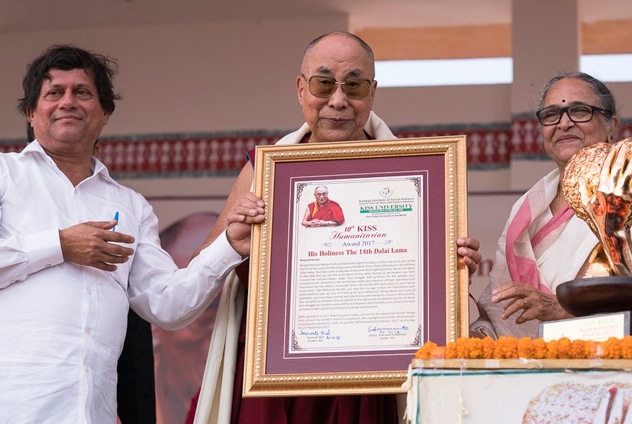Dharamshala — His Holiness the Dalai Lama was awarded the 10th KISS Humanitarian Award by the Kalinga Institute of Social Sciences (KISS) University on November 21, in front of an audience of more than 25,000 students.
 Dharamshala — His Holiness the Dalai Lama was awarded the 10th KISS Humanitarian Award by the Kalinga Institute of Social Sciences (KISS) University on November 21, in front of an audience of more than 25,000 students.
Dharamshala — His Holiness the Dalai Lama was awarded the 10th KISS Humanitarian Award by the Kalinga Institute of Social Sciences (KISS) University on November 21, in front of an audience of more than 25,000 students.
The spiritual leader was welcomed by Dr Achyuta Samanta, founder of KISS and KIIT, and university officials. Dr Samanta introduced His Holiness to the audience, explaining what the words Dalai and Lama mean and what the training of a Tibetan Buddhist monk entails. He proceeded to offer His Holiness the 10th KISS Humanitarian Award before inviting him to address the students.
“I always consider that the shape of the future is in our hands,” he observed. “The past is past and can’t be changed, but the future has not yet arrived. Young people like you have the opportunity and responsibility to shape it by creating a better world. Despite many remarkable developments, the 20th century was an era of violence, a time when, sadly, scientists’ brilliant brains were put to destructive use. For example, they participated in the design and manufacture of nuclear weapons that were used twice against Japan.
“Although killing has continued since the beginning of the 21st century, steps should be taken to make this a century of peace. Since peace is destroyed by negative emotions like anger and jealousy, we have to find ways to develop inner peace if we are to create peace in the world. It’s worth asking yourself whether you feel happy when you’re angry. Anger and extreme irritation all too easily lead to violence. So, how are we to reduce anger? By increasing our sense of love and compassion.
“Scientists have evidence that basic human nature is compassionate. If it were not, there would be no hope. However, our common experience is that we are all born from a mother and survive in her care. Common sense tells us that even if our neighbours are poor, if they shows signs of affection, we think of them as good neighbours. What’s more, anger and violence bring disaster. They make you lose your peace of mind. They spoil the atmosphere wherever you are.
“When we are young we appreciate love and compassion, but as we grow up we become more interested in money and status. One of the reasons for this is that modern education is inadequate because it tends only to have material goals with little scope for inner values.
“It’s worth reminding ourselves that all 7 billion human beings are physically, mentally and emotionally the same. But if we allow ourselves to think in terms of being privileged or under-privileged, belonging to higher, lower or no caste, it will only fortify division. This is unhelpful, out of date and undemocratic. Reminding ourselves of the oneness of humanity, that we are all the same in being human, is, on the other hand, a great source of confidence.
“The modern world lacks moral principles and doesn’t understand how to tackle negative emotions. Because of this, what we can learn from ancient Indian knowledge of the workings of the mind and emotions can be very relevant today. Many Indians today neglect this knowledge, but I am encouraging young Indians I meet, like you, to pay attention to it because it’s on the basis of this kind of understanding that we can build a more compassionate society.”


![Tibet has a rich history as a sovereign nation until the 1950s when it was invaded by China. [Photo: File]](/images/stories/Pics-2024/March/Tibet-Nation-1940s.jpg#joomlaImage://local-images/stories/Pics-2024/March/Tibet-Nation-1940s.jpg?width=1489&height=878)















